外研版英语必修一Module 6 单元教学设计共6课时
外研版必修一module6教案及说课稿
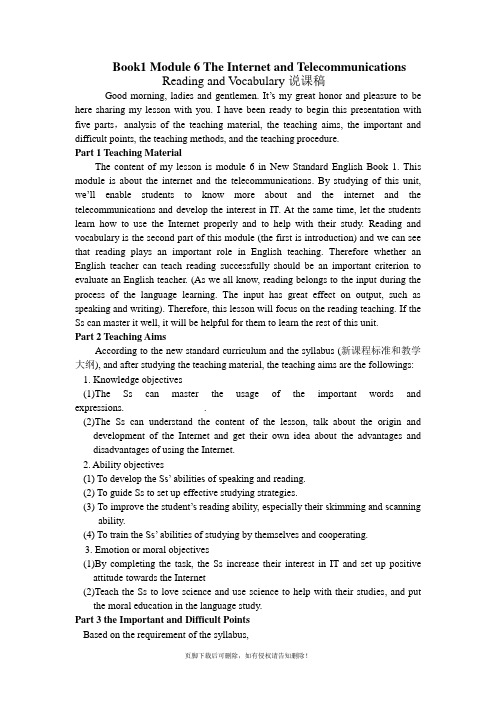
Book1 Module 6 The Internet and TelecommunicationsReading and V ocabulary说课稿Good morning, ladies and gentlemen. It’s my great honor and pleasure to be here sharing my lesson with you. I have been ready to begin this presentation with five parts,analysis of the teaching material, the teaching aims, the important and difficult points, the teaching methods, and the teaching procedure.Part 1 Teaching MaterialThe content of my lesson is module 6 in New Standard English Book 1. This module is about the internet and the telecommunications. By studying of this unit, we’ll enable students to know more about and the internet and the telecommunications and develop the interest in IT. At the same time, let the students learn how to use the Internet properly and to help with their study. Reading and vocabulary is the second part of this module (the first is introduction) and we can see that reading plays an important role in English teaching. Therefore whether an English teacher can teach reading successfully should be an important criterion to evaluate an English teacher. (As we all know, reading belongs to the input during the process of the language learning. The input has great effect on output, such as speaking and writing). Therefore, this lesson will focus on the reading teaching. If the Ss can master it well, it will be helpful for them to learn the rest of this unit.Part 2 Teaching AimsAccording to the new standard curriculum and the syllabus (新课程标准和教学大纲), and after studying the teaching material, the teaching aims are the followings: 1. Knowledge objectives(1)The Ss can master the usage of the important words and expressions. .(2)The Ss can understand the content of the lesson, talk about the origin anddevelopment of the Internet and get their own idea about the advantages and disadvantages of using the Internet.2. Ability objectives(1) To develop the Ss’ abilities of speaking and reading.(2) To guide Ss to set up effective studying strategies.(3) To improve the stu dent’s reading ability, especially their skimming and scanningability.(4) To train the Ss’ abilit ies of studying by themselves and cooperating.3. Emotion or moral objectives(1)By completing the task, the Ss increase their interest in IT and set up positiveattitude towards the Internet(2)Teach the Ss to love science and use science to help with their studies, and putthe moral education in the language study.Part 3 the Important and Difficult PointsBased on the requirement of the syllabus,The important points:1) Encourage the students to talk about computers as well as the Internet.2) Help the ss make sense of the passage.The difficult points are:1)Lead the ss to talk in class actively.2)Deal with some difficult language points.Part 4 Teaching MethodsAs is known to us all, a good teaching method requires that the teacher should help Ss develop good sense of the English language. For achieving these teaching aims, (after the analysis of the teaching material and teaching aims,) I will use the following methods according to the modern social communication teaching theories .municative Approach2.Whole Language Teaching3.Task-based Language Teaching4.Total Situational Action a “scene —activity〞teaching method , it establishesa real scene and the interaction between the teacher and the Ss. At the same time,CAI can provide a real situation with its sound and picture, it can develop the Ss creativity in learning English.Part 5 Teaching ProcedureStep 1. Lead-in. (5min)Let Ss answer some questions about the Internet.Purpose of my design: (1) to catch Ss’ attention about the class.(2) To set up develop interest in Internet.Step 2. Pre-readingTask 1. ( group work 5 min)Let Ss do a competition between groups to test how much they know about the Internet.Purpose of my design: (1) to get to know more about the Internet(2) To have a better understanding about how the Internet has changed our life. Step 3. While-readingTask 1. (Individual work and pair work 3 min)Skimming: Ss should read the material fast to choose the best title for the passage and find out the main idea for each paragraph. Ask Ss to check their answer with their partners and then the teacher calls back the answer.Para 1 The definition of the InternetPara 2 The origin of the Internet startPara 3 The definition of the World Wide Web?Para 4 Berners-Lee invented the World Wide WebPara 5 The development of WWW.Para 6 The present situation of Berners-Lee.Scanning:Task 1 . (Individual work 3 min)Ask Ss to read the material carefully and find out the correct answers to finish the following chart.Task 2. (Individual work and pair work, 5 min )Ask the students to finish activity 3.( Decide if these sentences are true or false.Task 3 ( individual work 6min)Ask the ss to finish activity 4.Purpose of my design: Enable students to understand the given material better by using different reading skills. And p roper competition can arouse the Ss’ interest in English learning. “Task-based〞teaching method is used here to develop the Ss’ ability of communication and also their ability of co-operation will be well trained.Step 4. Post-reading(group work, class work; 8min)Discuss the advantages and disadvantages of using the Internet with other group members and then choose a reporter to share their opinions with the whole class.Purpose of my design: I think If the Ss can finish this task well, they will benefit a lot in their spoken English. Most Ss can take their parts in the activities, especially for the Ss who have trouble in English study.Step 5. HomeworkWrite a passage about the advantages and disadvantages of using the Internet.Purpose of my design: Homework is so important and necessary for to master the knowledge they learned after class. It will check whether the Ss achieve the teaching aims.【本文档内容可以自由复制内容或自由编辑修改内容期待你的好评和关注,我们将会做得更好】。
外研版必修一英语module_6_单元教案

Module 6 Teaching planI.教学内容分析本模块以“The Internet and Telecommunications”为话题,介绍了因特网的起源,因特网和现代通讯工具在现代交际中的作用,以及科学技术发展对人类生存方式的影响。
要求学生了解有关电脑、网络、电信的词汇,了解因特网的历史和电信业的发展。
通过模块学习,要求学生能正确地、客观地、辩证地看待因特网和现代通讯设备,能利用因特网获取有益的信息,自觉抵制其消极面。
Introduction部分通过直观形象的词汇学习,要求学生了解并掌握电脑常见部件的名称,通过选择题的形式来掌握其英语解释,培养学生用英语思维的方式。
Activity 3还给出了许多新词汇,让学生根据不同的词义来选择相应的词汇和区分词汇的意思。
Reading and Vocabulary部分选取了学生比较熟悉的内容,介绍了因特网、因特网的兴起和万维网的发明。
通过学习,使学生了解有关因特网和万维网的知识。
通过完成设定练习,使学生进一步提高获取信息并准确理解文章内容的能力,并巩固新学的词汇。
在情感态度方面,通过对文中主人公事迹的谈论,使学生树立正确的人生观、价值观和世界观。
Grammar 1部分介绍了构词法知识——合成词的构成。
旨在让学生了解合成词的三种构成方式,并通过相关的练习学会用名词的构成法猜测新词的意思,从而对日益增加的词汇有个了解。
Listening and Vocabulary是一段老师、学生和家长的采访录音,要求学生正确理解各被采访人对互联网的观点和态度。
并通过小组讨论的形式让学生对互联网的利弊有一定的认识。
Pronunciation部分通过一段节选自听力材料的简短对话,使学生明确两点:1.句子中表示重要信息的词应当重读;2.重读表达了说话者的强烈感情。
Grammar2部分通过课文里的短语名词,帮助学生复习并巩固定冠词和零冠词的用法。
Writing部分先让学生阅读一篇论述因特网优点的小短文,认识到因特网对现代生活的影响。
新外研版选择性必修一 Unit 6 单元整体教学设计
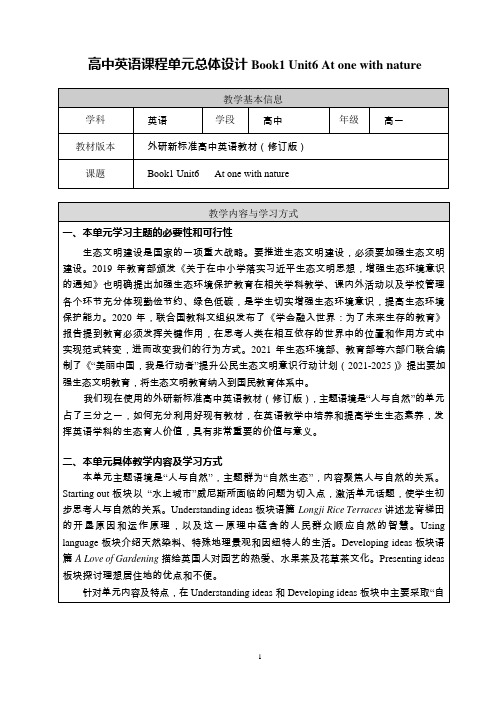
高中英语课程单元总体设计Book1 Unit6 At one with nature主提问式”的阅读学习方式,培养学生的自主阅读能力。
在Starting out 和Presenting ideas 板块中采取小组合作的学习方式,多边互动,使学生的主动性和创造性得以充分的发挥。
在Using language 板块中采取“问题探究式”和“训练式”的学习方式,教师引导学生探求答案,总结规律并巩固练习。
基于主题意义将本单元重新整合为四大板块,共五个课时。
单元目标:通过本单元的学习,学生能够:1.描述威海地貌, 并辩证地阐述自然环境与人类生活的关系,正确认识尊重自然、与自然和谐相处的重要性。
2.以威海省级非物质文化遗产项目“海草房民居建筑技艺”为例,正确使用含“介词+ 关系代词”结构的定语从句,以逻辑顺序阐述人类对自然环境的合理利用。
3.从人类创造自然环境的角度,介绍威海名片—国家园林城市。
4.针对一篇关于威海特产—无花果的说明文,写一篇概要。
评价设计:1.可以结合上下文内容和语境推测出不熟悉的单词或表达的意思,获取细节,完成表格。
并根据表格内容和笔记,复述所听内容。
2.能够发散思维,提出因纽特人更多生活方式方面的优缺点,能够客观辩证地评价问题。
3.尽可能多地使用表示benefits 和disadvantages 的句式;多角度地思考选择理想居住地的原因,如在思考benefits 时,除了包括地理条件、生活条件等方面,还可考虑地方未来发展、人际关系等,拥有思维的宽度。
4.经过课上讨论和课后查阅资料后,整合资源,形成书面报告。
课时三:因地制宜课时目标:1.通过寻找主题句、区分主次要信息等方法,概括作者的主要写作内容,并分析说明文的写作顺序。
2.能够根据图示,以逻辑顺序讲述梯田的运作原理。
3.发表对当地人沿用传统耕作方式的看法,从文化遗产的角度来审视祖先留下来的耕作方式,形成保护和发展重要农业遗产的意识,并总结出作者的写作目的。
外研新标准高一英语上 必修一 module 6 教案
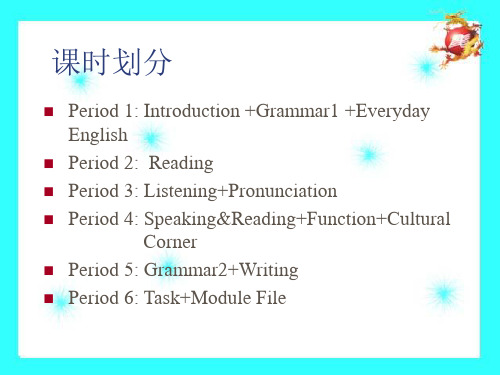
Period 3 Listening, Pronunciation
Words preparation *concentrate, independent
Ask students about their opinions first then listen
A lot of examples and practice about articles
According to the given words and expressions, write a paragraph in class.
Students exchange The teacher select some to read and
Ask some questions Read for details ( chart can be used ) Explain and practice some language points
Eg 1 By 2020,much web traffic could be in China 2 come up with 3 Everyone in the world can access the internet
eg: monitor, mouse, access, cras--
Period 2 Reading
Revise the words Fast read to get the general ideas. Listen to the tape ( close books)
80% 50,000 35.5 886 About 80 percent of the students are from
Zhoucun. About 80 percent of the web traffic is in
新课标高中英语必修一教学案(外研版))全套第六单元
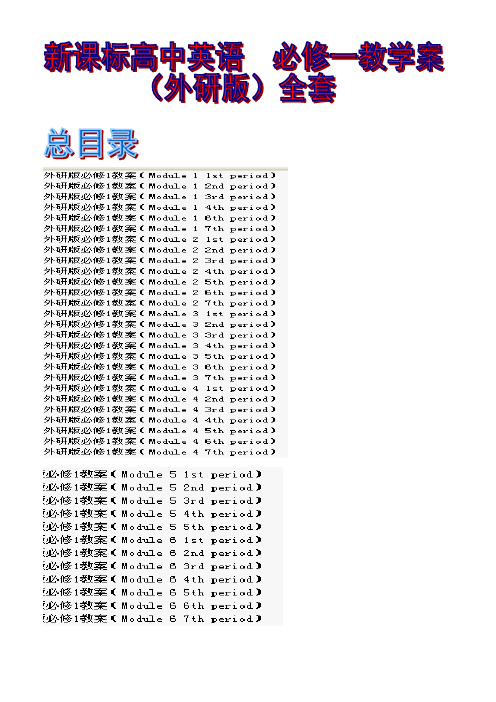
The Seventh PeriodThe General Idea of This PeriodIn Cultural Corner we will get to know why people use text messages and emotions by mobile phones.In Task you are asked to design a poster to introduce the use of the Internet.The Module File is the summary ofvocabulary,grammar,pronunciation and Every-day English.And these are also the key points of this module.Teaching AimImprove the students’abilities of reading and writing.Teaching Important PointGet to know some text messages and master the vocabulary,grammar and everyday English.Teaching Difficult PointHow to improve the students’ability of writing.Teaching MethodsRevision,practising and sum-up methods.Teaching Aids1.a projector2.multimedia3.the blackboardTeaching ProceduresStep 1 Revision and Lead-inT:Hello,everyone!Ss:Hello,teacher!T:In this class we’ll first review the usage of the article.Now let’s take up Workbook Activity 3.(Show the exercise to the student on the screen.)The Wonderful World of ICQ!ICQ is short for “I Seek You”,and is an easy-to-use Internet programme which makes (1)_________communication online easy.With ICQ,you can chat,send(2) _________messages and files,play (3) _________games and surf(4) _________Net with your friends,and much more.With just (5) _________click of your mouse,you and your friends are instantly connected.Using ICQ is simple.When you install ICQ,(6) _________programme asks you to register.At (7) _________time of registration,you receive (8) _________ special ICQ number.You can also enter (9) _________information about yourself which allows other ICQ users to recognise you when you log on.Once you’ve registered,you can make (10) _________list of your ICQ friends.ICQ will then use (11) _________ list to identify your friends.As soon as you log onto (12) _________ Internet,ICQ automatically lets(13) _________people know you are online.Whether you are in(14) _________Asia or (15) _________Europe,in(16)_________UnitedStates or (17) _________China,in (18) _________London or (19) _________Beijing,you can access your friends from anywhere and at any time through ICQ.Keys:(1)/(2)/(3)/(4)the(5)a(6)the(7)/(8)a(9)/(10)a(11)the(12)the(13)/(14)/(15)/(16)the(17)/(18)/(19)/T:OK.So much for the revision.Now listen carefully,everyone.I have a very good friend who is an English teacher.Yesterday he sent me a text message in Engliish by mobile phone,but I can’t understand what the messagemeans.(The teacher shows the following information on the multimedia. )T:Do you understand the message. Could you explain it to me?S:Yes,let me guess.Why not give me a call?I’ve been waiting for a long time.I’m so sa d.T:Now I am going to show you some text messages on three cellphones.Please read the messages and guess theirmeanings.(Pass on the cellphone messages to each other in the class.And then try to guess their meanings correctly.)T:Yes,very good,thank you.Let’s move on.Step 3 PresentationT:Now,boys and girls,let’s take up CULTURAL CORNER:Read the passage and answer the questions.Read the text silently and underline the words,phrases and sentences which the students do not understand or are not sure,and try to guess their meanings.Then try to find the answer to this question“Why people use text messages and emotions?”S:Deal with the questions of the passage.Answers:Where have you been?I have been waiting hours for a call.Do you want to go to the cinema tonight?I got a text message from my friend. She is having a party on Saturday.Do you want to come?Step 4 TaskStep 5 Module FileT:Now please look through the content you have learned in this module and try to write down some points that you don’t understand or anything you are not so sure of.Turn to me or your classmates/partners.S:Read through the columns by themselves and try to write down their questions.T:Now if you have no questions,let’s do some exercises on article(冠词).OK?S:Yes,let’s try.(Show the exercises to the students on the screen.)Ⅰ.Put the following phrases into English:(1)一件有用的工具(2)一家钢厂(3)过一两天(4)匆忙(5)从前(6)帮某人一个忙(7)因特网(8)万维网(9)在上大学时(10)当讲师(11)马萨诸塞工学院(12)一台旧电视(13)美国军队(14)短信(15)网络通信业务(16)工人阶级(17)入党(18)联合国(19)国庆节(20)踢足球(21)在中午(22)在1949 年春天(23)学英语(24)到学校去(25)在右边Ⅱ.Put the following into Chinese,paying attention to the use of articles:(1)He has just come back from a Beijing factory.(2)We are of an age.(3)The moon travels round the earth.(4)The young should respect the old.(5)She can play the piano.(6)The People’s Republic of China was founded on October 1,1949.(7)The Smith have moved to New York.(8)I enjoy swimming in summer.(9)A meeting will be held next Monday.(10)Bicycles are still very useful nowadays.(11)Physics is hard to learn.(12)He goes to school on foot.(13)He is in hospital.(14)The Greens are sitting at the table,reading newspapers.(15)The company is in the charge of Miss Wang.(16)He used to be a teacher till he turned writer.(17)Young girl as she is,she knows a lot.(18)Can you access the Internet at school?(19)Does the headmaster know how to use a computer?(20)God is believed to have made the universe.Key to the exercises:.(1)a useful tool(2)a steel plant(3)in a day or two(4)in a hurry(5)once upon a time(6)do sb. a favor(7)the Internet(8)the World Wide Web(9)at university(10)work as a lecturer(11)Massachusetts Institute of Technology(12)an old television(13)the American Army(14)text messages(15)web traffic(16)the working class(17)join the Party(18)the United Nations(19)National Day(20)play football(21)at noon(22)in the spring of 1949(23)learn English(24)go to the school(25)on the right.(1)他刚刚从北京一家工厂回来。
外研版高中英语必修一 Module6 Reading and Vocabulary教案-新版
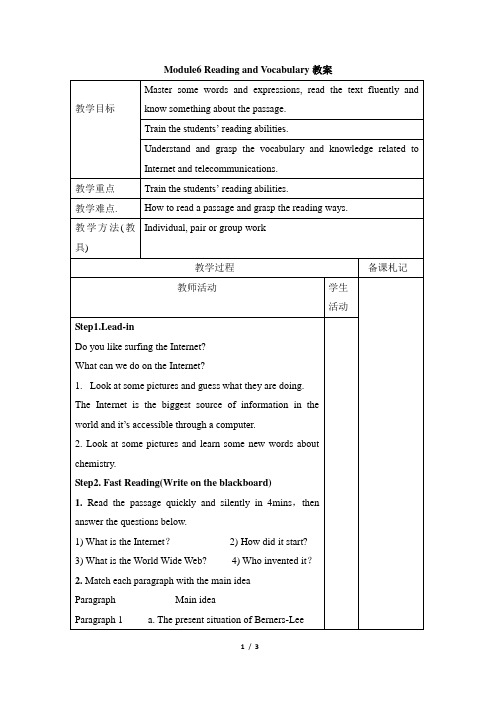
1) There are millions of pages of information on the Internet. ( T )
2) The US army were the first people who used an Internet system. ( T )
Paragraph 2 b.Berners-Lee invented the World Wide Web
Paragraph 3 c. The definition of the World Wide Web
Paragraph 4 d. Everyone can use the Internet
Paragraph 5 e. How the Internet started
Step5. The design on the blackboard
WriteStep2. Fast Reading& Step3. Detail reading on.
导学后记
Module6Reading and Vocabulary教案
教学目标
Master some words and expressions, read the text fluently and know something about the passage.
Train the students’ reading abilities.
6) He has made a lot of money from his invention. ( F )
Step4. Homework
What do you want to say to your friends whoare addicted to(对……上瘾) Cyber bars?
外研版高中英语必修一教案Module 6 2nd period
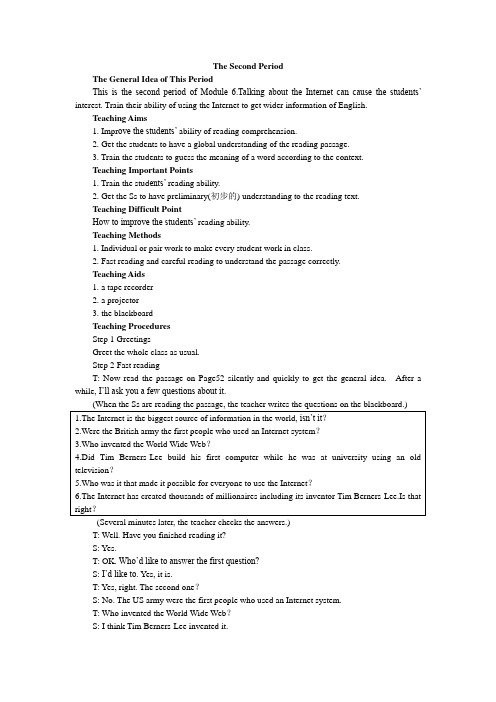
The Second PeriodThe General Idea of This PeriodThis is the second period of Module 6.Talking about the Internet can cause the students’interest. Train their ability of using the Internet to get wider information of English.Teaching Aims1. Impr ove the students’ ability of reading comprehension.2. Get the students to have a global understanding of the reading passage.3. Train the students to guess the meaning of a word according to the context.Teaching Important Points1. Train the stud ents’ reading ability.2. Get the Ss to have preliminary(初步的) understanding to the reading text.Teaching Difficult PointHow to improve the students’ reading ability.Teaching Methods1. Individual or pair work to make every student work in class.2. Fast reading and careful reading to understand the passage correctly.Teaching Aids1. a tape recorder2. a projector3. the blackboardTeaching ProceduresStep 1 GreetingsGreet the whole class as usual.Step 2 Fast readingT: Now read the passage on Page52 silently and quickly to get the general idea. After a while, I’ll ask you a few questions about it.1.The Internet is the biggest source of information in the world, isn’t it?2.Were the British army the first people who used an Internet system?3.Who invented the World Wide Web?4.Did Tim Berners-Lee build his first computer while he was at university using an old television?5.Who was it that made it possible for everyone to use the Internet?6.The Internet has created thousands of millionaires including its inventor Tim Berners-Lee.Is that right?(Several minutes later, the teacher checks the answers.)T: Well. Have you finished reading it?S: Yes.T: OK. Who’d like to answer the first question?S: I’d like to. Yes, it is.T: Yes, right. The second one?S: No. The US army were the first people who used an Internet system.T: Who invented the World Wide Web?S: I think Tim Berners-Lee invented it.T: Good, right. The fourth question?S: Yes, he did.T: The fifth one?S: Berners-Lee.T: The last one?S: That’s wrong.Tim Berners-Lee hasn’t made much money from his invention.He now works as a lecturer at Massachusetts Institute of Technology in Boston.Step 3 Careful readingT: Well. Now re-read the passage carefully to further understand it. Then work in pairs to discuss if these sentences on Page 53 are true (T) or false (F).T: Who would like to judge the first statement?Chen Ming, can you have a try?S: I think it’s true.T: The second one, Liu Chen, please.S: True.T: Of course, this is true. Now the third sentence, you, please.S: I think it is false, because it is the US army who first used an Internet system.T: The fourth one?S: True.T: Now the fifth sentence. Who’s volunteer?You, please.S: It’s true.T: Now the last one. Wang Min, please.S: False. Tim Berners-Lee is a lecturer at a university, so I don’t think he is a very rich person.Step 4 Practice1. Ask the students to decide which of the sentences is true or false individually.2. Put the students in pairs to compare their answers.3. Check the answers with the whole class.Answers:(1)b(2)a(3)b(4)aStep 5 Summary and HomeworkT: In this class we’ve learned something about the Internet and computers. We know there are millions of pages of information on the Internet, and the US army were the first people who used an Internet system. We also know that Tim Berners-Lee invented the World Wide Web and so on. After class, please further consolidate and understand the reading. Besides please read the passage again and again. That’s all for today. Goodbye, everyone.S: Goodbye, teacher!Module 6The Internet andTelecommunicationsThe Second Periodaccessible academic army communication consist of defence develop lecturer military millionaire network organisation percentage source system university web browser。
高中英语新课标外研版必修1教案(Module 6 6th period)
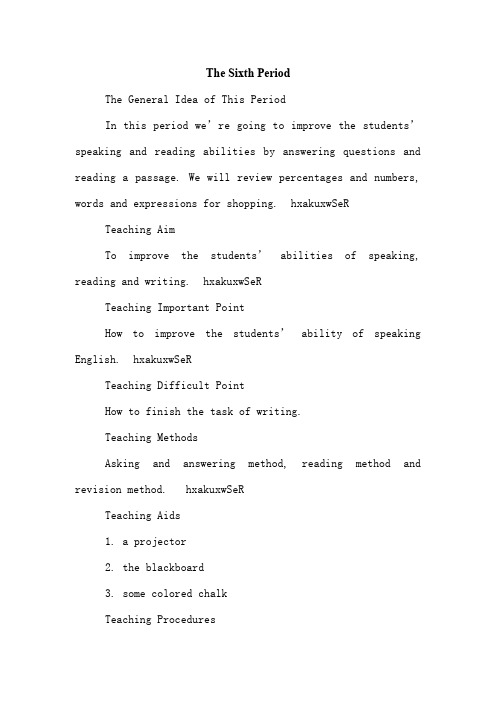
The Sixth PeriodThe General Idea of This PeriodIn this period we’re going to improve the students’ speaking and reading abilities by answering questions and reading a passage. We will review percentages and numbers, words and expressions for shopping.hxakuxwSeRTeaching AimTo improve the students’ abilities of speaking, reading and writing.hxakuxwSeRTeaching Important PointHow to improve the students’ ability of speaking English.hxakuxwSeRTeaching Difficult PointHow to finish the task of writing.Teaching MethodsAsking and answering method, reading method and revision method. hxakuxwSeRTeaching Aids1. a projector2. the blackboard3. some colored chalkTeaching ProceduresStep 1 GreetingsGreet the whole class as usual.Step 2 Revision and Lead-inT: In this module we studied the grammar: Compound Words. Do you still remember some compound nouns and compoud adjectives?hxakuxwSeRS: Yes, we do.T: As you know, compound words are very active in English. There are lots of compound nouns in English. They can be used as subject, object, etc. in the sentences. Could you please give me some examples? Any volunters?hxakuxwSeRS: For example: Sightseeing took up the whole morning.hxakuxwSeRT: Yes, good. Here the word “sightseeing” is used as subject. Can a compound word be used as an object? Who knows?hxakuxwSeRS: I know. Finally we reached a cross-road.T: Very good. It can also be used as a prepositional object. Now take this sentence for example: Smoking is not allowed during take-off(休息>.What is more, we have plenty of compound adjectives. Compound adjectives can be usedas attribute and predicative. Now who can make sentences with “long-term” and “airsick”? Any volunteers? OK, Li Lei, please have a try.hxakuxwSeRS: They helped us to map out a long-term plan. Are you airsick?hxakuxwSeRT: Yes. The Chinese meaning is “他们帮助我们制订了一个长期计划。
外研版必修一英语module_6_教学设计

Module 6 The Internet and telecommunicationsPart One: teaching Design第一部分教学设计Teaching aims and requirements of the unit●To learn about some vocabulary and knowledge related to the internet and telecommunications ●To develop students’ expression abili ty as well as reading ability by reading the text●To raise students’ interests in the internet and telecommunications●To listen and speak using the vocabulary and everyday English in this unitTeaching important pointTo learn the use of the definite article and zero article and compound wordsTeaching proceduresPeriod 1: Introduction and readingStep 1: Warming up1.Warming up by a surveyHello, everyone! We all know the Internet has been the easiest way to get information, now you are required to do a group of survey about it, the following questions can help you. After you collect the information, report the result to your group members.1)How many people in your group surf the internet?2)How often do they use it?3)What do they mainly use it for?2.Warming up by a discussionHello, everyone! We all know the Internet has been the easiest way to get information, but different people have different opinions about it, please work in groups and discuss the following questions:1)What are the advantages of surfing the Internet?2)What are the disadvantages?3)What is the attitude of your school and parents to the use of the Internet?3.Warming up by vocabularyGood morning everyone! Look at the computer; please tell me the name of the different part of it. You can use the words in the box.1.DiscussionAs we all know, the Internet plays an important part in modern life, but do you know1)What is the Internet?2)How did it start?3)Who invented it?Please discuss the questions with your desk mate to see if you can get the correct answer.2.Introduce some new wordsPlease look at the new words from the text, read them carefully and pay attention to your2)The Internet was first invented for ______ use.3)The palace is _______ through a secret access.4)Body language is a common way of people’s daily _______.5)The biggest international _______ in the world is the UN.6)Dickens ______ many wonderful characters in his novel.7)I never fight except in self-_______.8)Where does the Yellow River have its _______.9)To everyone’s surprise, the boy survived the air ______.10)The Internet created thousands of ________, they are very rich.(Keys: 1 via 2 military 3 accessible 4 communication 5 organization 6 created 7 create 8 source9 crash 10 millionaire)Step 3: Reading1.Leading-inAfter knowing some new words in the text, let’s come to next question----Do you know the differences between the I nternet and the World Wide Web? Ok, let’s get the exact answer in the text.2.Fast reading for the general ideaAfter reading the text, please choose the best summary of the text.A.It mainly tells us the invention and development of the internet.B.It mainly tells us the invention and development of the World Wide Web.C.It mainly tells us who invented the internet and the World Wide Wed.D.It mainly tells us the invention and development of the World Wide Web and the internet. (Key: D)school web browser document millionaire)4.Detailed reading for informationRead the following sentences and decide if these sentences are true (T) or false (F).1 There are millions of pages of information on the Internet.2 The US army were the first people who used an Internet system.3 Universities started using the Internet at the same time as the army.4 The percentage of websites in English is getting smaller.5 Tim Berners-Lee made it possible for scientists to use the Internet.6 He has made a lot of money from his invention.(Keys:1T 2T 3F 4F 5F 6T)Step4: Reading practiceRead the following passage within 7 minutes and make a better choice to each problem.You’ve just got a new computer and you are delighted with it. It is doing everything you want it to do. But what are you going to do with your old computer?In the past consumers have often paid high prices for their old computers, but how much do you think these computers are worth now? Few people want to buy a computer which has become out-of-date or has been replaced by a newer mode. Unfortunately, the only thing you can do with a computer which you have ad for five or six years is to throw it away with your other garbage.What do many people do when they try to sell their old computers? Foolishly, they take into account its original cost and then reduce the price according to the age of the computer rather like a second-hand car. They forget that new computers are becoming cheaper every day, making old computers almost worthless. In 1985, for example, a good computer cost over $4,000. Then years later its owner would be lucky to get $ 400.One well-known computer magazine recently compiled a list of 10 things to do with an old computer. One suggestion was to donate it to charity or give it as one of the small prizes in a competition. The final suggestion was to keep it in a safe place and hope that it would become a collector’s item in 15 or 20 years —though the article in the magazine admitted that in 15 or 20 years, there may be so many old computers that they will all be worthless.1. What does the underlined part mean?A. FashionableB. No longer fashionableC. Second handD. Worthless2. The best way to do with an old computer is _________.A. to throw it awayB. to evaluate it and sell itC. to donate it to the poorD. keep it at home3. How many ways are mentioned in the passage to do with an old computer?A. 10B. 12C. 5D. 44. The title of the passage could be __________.A.T hrow Away Your old computerB.How Much Does An Old Computer Cost Now?C.My Old ComputerD.U nless Computer(Keys:1. B 2. C 3. D4. C )Step 5: Homework1.Try to repeat the text to your deskmate orally.2.Do Ex4 on page 533.Learn the new words again using the dictionary if necessary.Module Six The Internet and telecommunicationsPart One: teaching Design第一部分教学设计Teaching aims and requirements of the unit●To learn about some vocabulary and knowledge related to the internet and telecommunications ●To develop students’ expression ability as well as reading ability by reading the text●To raise students’ interests in the internet and telecommunications●To listen and speak using the vocabulary and everyday English in this unitTeaching important pointTo learn the use of the definite article and zero article and compound wordsTeaching proceduresPeriod Two: Grammar and usageStep 1: General introduceCompounds are mainly nouns or adjectives that are made up of at least two parts. And each part has a separate meaning. There are noun compounds, adjective compounds, verb compounds and adverb compounds. The followings are specific introduction of compounds words.1. Noun compounds (名词合成词)1). noun + nounbasket + ball = basketball house + work = houseworknews + paper = newspaper bed + clothes= bedclotheswood + cutter= woodcutter battle+ field= battlefieldschool +leaver= school-leaver2). adj. + nounblack + board =blackboardEnglish + man = Englishmanloud + speaker = loudspeakerfree + way= freewayshort + wave = shortwavemain + land= mainland3).adv./ prep. + nounhard + seat= hard-seatafter + noon = afternoonover + coat = overcoatin + land = inland4). noun + v-ingsight + seeing=sightseeinghorse +racing= horse racingtape +recording= tape recording5). v. + adv.get + together = get-together2. Adjective compounds (合成形容词)1). noun. + adj.world + famous= world-famousradio+ active =radioactive2). adj. + adj.reddish + brown = reddish-brown3). n. / adj. + nouneasy + going = easy-goingfun + loving= fun-loving4). n. / adj. + p.p.man+ made. = man-madesun+ burnt= sun burntwide+ spread = widespreadill +formed = ill formed5). noun /adj. + noun + edkind + heart + ed = kind-heartedblue + eye + ed = blue-eyedcold + blood + ed = cold-blooded . glass + topped = glass-toppedsimple + minded = simple-mindedright + handed = right-handed6). adv. (pronoun. / numeral) + nounevery + day =everydayunder + ground = undergroundsecond + hand =secondhand3. adv. / preposition compounds (合成副词)adv. / preposition + noun.in + side = insidedown + stairs = downstairsDown +hill = Downhill4. verb compounds (合成动词)adv. + verbunder + line = underlineover + come = overcomeover + look = overlookStep 2: The use of compounds in the sentence 1Used as attributiveThey helped us to map out a long-term plan. Open-air exercises will do you good.What they need is a down-to-earth spirit.2 Used as predictiveShe is lively and outgoing.Are you airsick?3. Used as subject and objectSightseeing took up the whole morning.We walked till we reached the cross-roads.4. Used as adverbialShe greeted them warm-heartedly.You can’t just do as you please, willy-nilly.Attention:sometimes we can’t translate these compounds words directly ,for example “loudspeaker” doesn’t mean“大声说话的人”,but “扬声器”。
高中英语外研版必修1 教学设计 Module 6
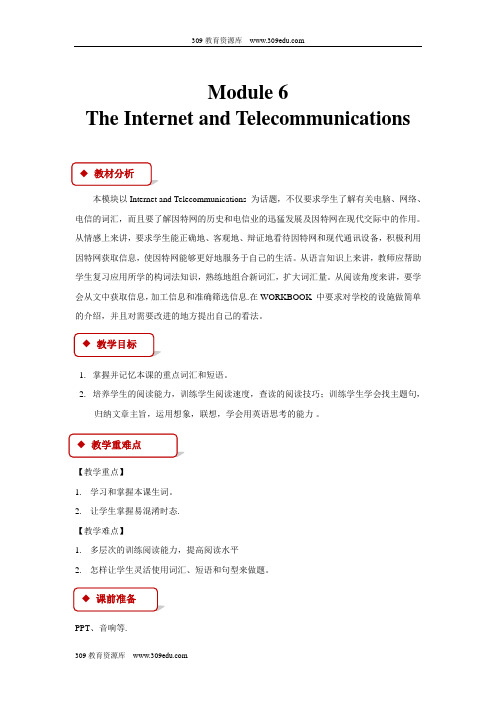
Module 6The Internet and Telecommunications本模块以Internet and Telecommunications 为话题,不仅要求学生了解有关电脑、网络、电信的词汇,而且要了解因特网的历史和电信业的迅猛发展及因特网在现代交际中的作用。
从情感上来讲,要求学生能正确地、客观地、辩证地看待因特网和现代通讯设备,积极利用因特网获取信息,使因特网能够更好地服务于自己的生活。
从语言知识上来讲,教师应帮助学生复习应用所学的构词法知识,熟练地组合新词汇,扩大词汇量。
从阅读角度来讲,要学会从文中获取信息,加工信息和准确筛选信息.在WORKBOOK 中要求对学校的设施做简单的介绍,并且对需要改进的地方提出自己的看法。
2. 培养学生的阅读能力,训练学生阅读速度,查读的阅读技巧;训练学生学会找主题句,归纳文章主旨,运用想象,联想,学会用英语思考的能力 。
【教学重点】1. 学习和掌握本课生词。
2. 让学生掌握易混淆时态.【教学难点】1. 多层次的训练阅读能力,提高阅读水平2. 怎样让学生灵活使用词汇、短语和句型来做题。
PPT 、音响等.Step 1 IntroductionThe purpose of this part is to let the students learn the words in INTRODUCTION and finish Activities 1, 2 and 3.1. What can we do using a computer?Play games/Download music and films/WatchTV and movies online/Read novels online2. Match the pictures with the words.Step 2 Reading and vocabulary1.Read the text quickly and match the main ideas with the paragraphs.Para.1A.The definition of the World Wide Web.Para.2 B.The inventor of the World Wide Web.Para.3 C.The current condition of Berners Lee.Para.4 D.The development of the Internet.Para.5 E.The start of the Internet.Para.6 F.The definition of the Internet.答案:Para.1:F Para.2:E Para.3:A Para.4:BPara.5:D Para.6:C2..Read the text carefully and choose the best answers.1).Which of the following is TRUE about Berners Lee?A.He now works as a lecturer at Massachusetts Instituteof Technology.B.He invented the first computer and made a lot ofmoney.C.He came up with the idea of the Internet while atuniversity.D.He made it possible for universities to use the Internet.2).The text is mainly about________.A.the invention of the Internet。
新外研社高中英语必修一Unit6Atonewithnature--Presentingideas教案
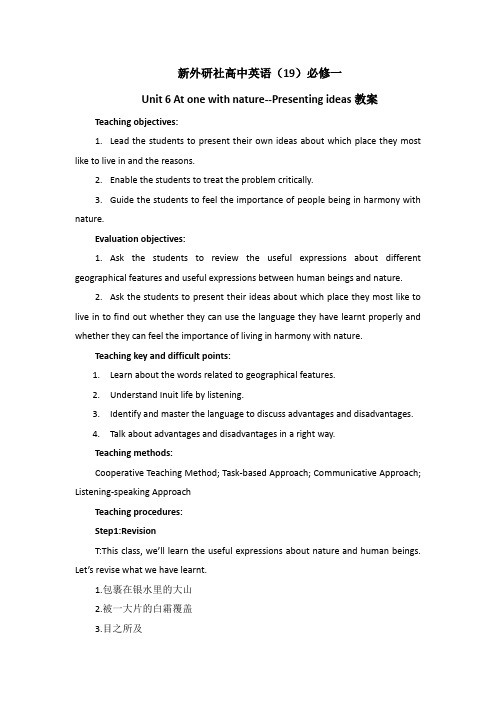
新外研社高中英语(19)必修一Unit 6 At one with nature--Presenting ideas教案Teaching objectives:1.Lead the students to present their own ideas about which place they most like to live in and the reasons.2.Enable the students to treat the problem critically.3.Guide the students to feel the importance of people being in harmony with nature.Evaluation objectives:1.Ask the students to review the useful expressions about different geographical features and useful expressions between human beings and nature.2.Ask the students to present their ideas about which place they most like to live in to find out whether they can use the language they have learnt properly and whether they can feel the importance of living in harmony with nature.Teaching key and difficult points:1.Learn about the words related to geographical features.2.Understand Inuit life by listening.3.Identify and master the language to discuss advantages and disadvantages.4.Talk about advantages and disadvantages in a right way.Teaching methods:Cooperative Teaching Method; Task-based Approach; Communicative Approach; Listening-speaking ApproachTeaching procedures:Step1:RevisionT:This class, we’ll learn the useful expressions about nature and human beings. Let’s revise what we have learnt.1.包裹在银水里的大山2.被一大片的白霜覆盖3.目之所及4.组织土壤被冲走5.被聪明设计6.与自然和谐7.为鸟和鱼提供完美的环境8.坐落在澳大利亚海岸线9.几乎2000米深10.吃大量的鱼和肉使我们的身体强壮,以便我们能够对抗寒冷。
高中英语 Module 6 1st period教案 外研版必修1
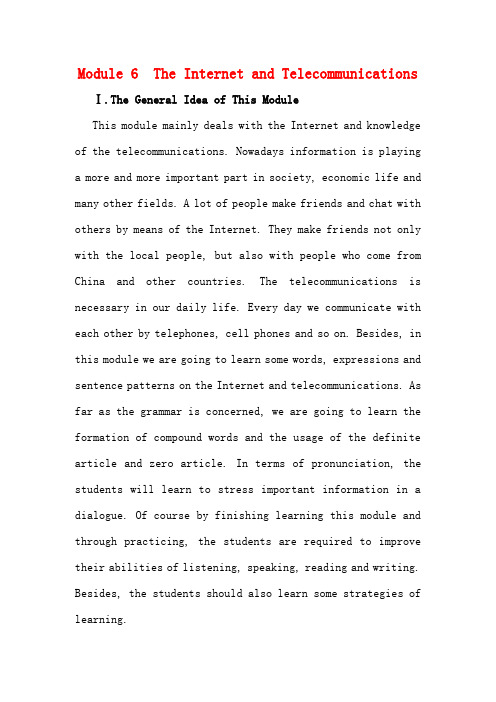
Module 6 The Internet and Telecommunications Ⅰ.The General Idea of This ModuleThis module mainly deals with the Internet and knowledge of the telecommunications. Nowadays information is playing a more and more important part in society, economic life and many other fields. A lot of people make friends and chat with others by means of the Internet. They make friends not only with the local people, but also with people who come from China and other countries. The telecommunications is necessary in our daily life. Every day we communicate with each other by telephones, cell phones and so on. Besides, in this module we are going to learn some words, expressions and sentence patterns on the Internet and telecommunications. As far as the grammar is concerned, we are going to learn the formation of compound words and the usage of the definite article and zero article. In terms of pronunciation, the students will learn to stress important information in a dialogue. Of course by finishing learning this module and through practicing, the students are required to improve their abilities of listening, speaking, reading and writing. Besides, the students should also learn some strategies of learning.INTRODUCTIONThree activities have been designed in this part. It introduces some words and expressions and their meanings on the Internet. Students are required to be familiar with these words and expressions so that they can have a further study of this module.READING AND VOCABULARYThis part mainly introduces the Internet, the setting up of the Internet to us. It also deals with the World Wide Web and the invention of it. The students are asked to know something about the Internet and have a knowledge of the World Wide Web by reading the paragraph. Post Reading and the designing of the activities aim at helping students test if they get the relevant information correctly or if they help them understand the information further.GRAMMAR 1This section introduces knowledge of word formation: the building of compound nouns. The students are asked to know the formation of the three types of compound nouns and then consolidate the knowledge by doing some exercises in Activity 1 and Activity 2.LISTENING AND VOCABULARYWe will complete the exercises on multiple choice and discussion by listening to a TV interview. The listening material aims at practicing the students’ listening skills and comprehension.PRONUNCIATIONThis section supplies a short dialogue, aiming at making the students understand that words of important information should properly be stressed in a specific situation.GRAMMAR 2This section mainly reviews the usage of articles by carrying out the four activities which have been designed. WRITINGThis section requires the students to read the short essay dealing with the advantages of Internet. And then the students are asked to write a short paragraph giving the opposite view according to the words and expressions given. Besides, the paragraph should deal with the importance of the help of the teachers and cooperation among the classmates. SPEAKING AND READINGLearn several compound nouns about the telecommunications. Read a short paragraph about mobile phones. Investigate the number of students who use mobile phones in the class. Finallydiscuss the questions given.FUNCTIONReview the expressing methods of percentages and numbers. EVERYDAY ENGLISHThis part mainly reviews the commonly used sentence patterns of shopping.CULTURAL CORNERGet to know that people send text messages by mobile phones, and get to know the phenomenon of using a series of symbols to show how they feel and how to express emotions. these students are able to answer the relevant questions.TASKWork in groups of two or more to design a poster, introducing the use of the Internet.MODULE FILESummarize the words and expressions, grammar, pronunciation and everyday English learned in this module.Ⅱ.Three-Dimensional Goals1.Knowledge and Skills(1) Be able to master the key words and expressions, read the text fluently and get to know something about the Internet and telecommunications.(2) The students are asked to know some forms of compound words. They are to master the basic usages of the definite article and zero article.2.Process and Methods(1) Learn independently and be instructed by the teacher. Try to have a knowledge of the Internet and telecommunications.(2) Inquiry and activity. The students are required to understand how to make friends, to study online and do shopping online through the Internet and telecommunications.(3) Practice of thinking. Try to get the students to know correctly the rapid development of the Internet and telecommunications and their function in modern communication.3.Emotion and ValuesStudents are asked to look at the Internet and modern equipment of telecommunications dialectically. Be able to use actively the useful resources to obtain and deal with information. Try to make them work for their study and life. Of course, the students must avoid indulging in electronic games. They mustn’t spend a lot of time on playing computergames.Ⅲ.Teaching Important PointsGet to know and compare the using of the Internet and telecommunications in China and other countries. Enable the students to grasp the words and phrases about computer, the Internet and telecommunications. And improve the students’abilities of reading comprehension and writing.Ⅳ.Teaching Difficult PointHow to improve the students’ abilities of listening and speaking in teaching.Ⅴ.Preparations of Teaching AidsA desk computer or a laptop, multimedia and a slide projectorⅥ.Teaching TimeSeven periods.The First Period: Introduction, Vocabulary and SpeakingThe Second and the Third Periods: Reading and VacabularyThe Fourth Period: Grammar 1, Listening and VacabularyThe Fifth Period: Pronunciation, Grammar 2 and WritingThe Sixth Period: Speaking and Reading, Function, Everyday EnglishThe Seventh period: Cultural Corner, Task and Module File, Workbook ExercisesThe First PeriodThe General Idea of This PeriodIn this period we’re going to learn vocabulary and the English definitions on the parts of the computer. And then we will finish the three activities on Page 51 and practise speaking English.Teaching Aims1. Learn and master the following:Words: access, crash, keyword, log, software, breakdownPhrases: click on, log on/off, computer hardware, computer software2. Develop the students’speaking ability by talking and discussing.Teaching Important Points1. Train the students’ speaking ability.2. Master the new words and expressions.Teaching Difficult PointHow to improve the students’ speaking ability.Teaching Methods1. Individual or group work.2. Explanation and practice methods.Teaching Aids1. a computer2. a projector3. the blackboardTeaching ProceduresStep 1 Greetings and Lead-inT: Hello, everyone.Ss: Hello, teacher.T: Sit down, please. Now in this unit we are going to learn something about the Internet and telecommunications. First of all, let’s learn the new words and expressions.Have you prepared?S: Yes.T: OK. Zhang Fang, please read the new words and expressions.Step 2 PresentationT: First, let’s l ook at some new words and expressions.(Show the following on the screen.)access crash Internet presonal computer keyword log website store softwarebreakdown email monitor hardware credit card(Teacher teaches the words and explains them; then says the following.)T: OK. As you know, the computer is playing an important part in our daily life. The Internet is used in almost every field of our society and economics. Can you label the picture with the words on Page 51?S: I want to have a try.(Give the answer to Exercise 1.)T: OK. Do you think what he answered is right?S: Yes, that’s right.T: Excellent. Now let’s deal with Exercise 2.Match the items with their definitions. Please think it over.(The students prepare for this exercise for two minutes.) T: Stop here, please. Now let’s check the answers with the whole class. Are you ready?S: Yes.T: All right, let’s begin.(The teacher asks 6 students to match the items one by one. Then check their answers.)Keys for reference:1→(c)2→(e)3→(b)4→(d)5→(f)6→(a)Step 3 PracticeT: Now let’s do Exercise 3.Please try to get the exact meaning of these words or phrases on Page 51.(Ss try to look them up in the dictionary or in the Student’s Book.)T: Please answer the questions about other possible meanings of the words.S: Surf.T: Right?Yes, good. Next, please.S: We can use the word “crash”.T: Do you think so?Yeah, right. The third one?S: Store.T: Right or wrong? Right. Now, the fourth question. Who’s volunteer? Li Yuan, pleaseS: I think log is length of tree-trunk that has fallen or been cut down. It can also be used as a verb, means: to enter (facts)in a log-book. The phrasal verb log on means: to open one’s online access to a database.Step 4 Summary and HomeworkT: In this class we’ve learnt some useful words and expressions on computers and the Internet. And we know themain names of the parts of the computer. What’s more,we’ve got to know the definitions of some of the computer terms.I hope you can master them after class. Please prepare for “Reading and Vacabulary”.So much for today. Goodbye, everyone.Step 5 The Design of the Writing on the BlackboardModule 6 The Internet andTelecommunicationsThe First Periodmonitor access crash log on/off breakdown surf storewebsiteStep 6 Activity and InquirySteps Students’Acting Teacher’s Organizing1 &2 Try to recognize and read the new wordsaccording to the illustration. And understand the meanings of thevacabulary. Get the students to label the picturewith a proper word3 Finish doing Activity 2.And findthe English definitions of each newword. The teacher checks the answers with thewhole class.。
- 1、下载文档前请自行甄别文档内容的完整性,平台不提供额外的编辑、内容补充、找答案等附加服务。
- 2、"仅部分预览"的文档,不可在线预览部分如存在完整性等问题,可反馈申请退款(可完整预览的文档不适用该条件!)。
- 3、如文档侵犯您的权益,请联系客服反馈,我们会尽快为您处理(人工客服工作时间:9:00-18:30)。
Module Six The Internet and TelecommunicationsPeriod OneTeaching content:Introduction; Reading and VocabularyTeaching goals: Enable the Ss to grasp the target words and phrases Teaching important points:1.Encourage the students to talk about computers as well as the Internet;2.Help the students make sense of the whole passage;3.Help the students improve their reading ability.Teaching difficult points:1.Lead the students to talk in class actively;2.Deal with some difficult language points.Teaching procedures:Step 1 Lead-in and IntroductionWith the development of science and technology,computers and the Internet have become an important part of our daily life.Most of you like surfing the Internet and some students even are addicted to it.But how much do you know about computers and the Internet?Next we`ll have a quiz.1.Activity1 on P51.2.Activity2 on P51.3.Activity3 on P51.Step 2 Pre-readingActivity6 on P53.(Ask the students to check if they know the meanings of these words;read aloud together.)Step 3 Reading1.Fast-readingAsk the students to read through the passage quickly and silently to get the main idea and then answer the questions in Activity1 on P52.nguage points(Ref: Notes to the text)3.Careful readingAsk the students to read the passage again carefully to get more details and then finish Activity3 on P53.Step 4 ConsolidationAsk the students to go through the passage one more time quickly to understand it better and then finish Activity4 on P53.[*Activity5 on P53 can be omitted.]Step 5 Summary and Homework1.Summary: Summarize what they have learned in this period.2.Homework: Reading on P99-100 in workbook.Appendix: Notes to the text1.…and it`s accessible through a computer.access['ækses] vt. 接近,利用,使用n. 接近,进入;接近(或进入,享用)的机会/权利accessible adj. 可接近的;可利用的;have access to sth. 有获得/进入…的权利/机会gain/get access to 到达某地;见到某人或某物eg:The public don`t have access to the site.You need a password to get access to the computer system.2.It consists of millions of pages of data.consist of 由…组成/构成(= be made up of);包括,包含eg:Our team consists of 12 members.His job consists of helping old people who live alone.3.It then became possible for universities to use the system as well.1)It is/becomes + adj. + for sb. to do sth.eg:It is important for us students to learn English well.2)as well(=too), 也(用于肯定句中,位于句尾)eg:He sent me a letter and some money as well.4.NSFNET became known as the Inter-Network,or "Internet".become/be known/famous as/foreg:Jingyong is known as a writer for his novels.eful expressionsclick on + the mouse/webpage/linklog on/offat the momentgo up/downcome up withmake it possible for sb. to do sth.allow sb. to do sth.from that moment ona/the number ofPeriod TwoTeaching content:Listening and Vocabulary & PronunciationTeaching important points:1.Learn to research by cooperation;2.Learn to catch necessary information when listening.Teaching difficult points:1.Lead the students to take an active part in class;2.Learn to stress important information while reading and speaking. Teaching procedures:Step 1 Greetings and Revision1.Greet the students as usual.2.Check the homework in last period OR ask some students to read the new words in this module.Step 2 Listening and Vocabulary1.Vocabulary(Activity1 on P54)Ask the students to read the words individually to check if they understand;explain;read aloud together.2.Listening(Activity2 on P54)Ask the students to read through the given information to predict the listening content first.Listen the first time to get the main idea and then finish Activity2.Listen again to understand it better after comparing the answers.[*3.Activity3 on P54 can be omitted.]Step 3 PronunciationAsk the students to read through the dialogue in pairs trying to mark and stress important words.Listen the first time to compare and then the teacher tells the answers to the students.Listen again to check the answers and understand it better.[Activity2 can be omitted.]Step 4 Summary and Homework1.Summary: Summarize what they have learned in this period.2.Homework: Activity4,5,6 on P98 in workbook.Appendix: Notes to the textUseful expressionsconcentrate on 专注于,集中精力于As much time as I can/possible.Period ThreeTeaching content:Grammar1; Grammar2 & FunctionTeaching important points:1.Learn to research by cooperation;2.Learn to make use of three kinds of articles correctly;3.Learn to remember words with the help of relative knowledge of word formation.Teaching difficult points:1.Lead the students to take an active part in class;2.Make the students learn how to use articles correctly.Teaching procedures:Step 1 Greetings and Revision1.Greet the students as usual.2.Check the homework in last period.Step 2 Grammar1-Compound Words1.Review Compound Words(Grammar9 on P112)2.Activity1 on P53.3.Activity2 on P54.Possible answers: hardware, hardboard(硬纸板), hard disk; keyboard; website; network(网络); notebook, notepad(笔记本,记事本); software Step 3 Grammar2-The Definite Article and Zero Article1.Review Articles(Grammar8 on P111-112)【定冠词可用在可数名词单数、可数名词复数和不可数名词前表特指;不定冠词用在可数名词单数前,可数名词复数、不可数名词前不用冠词时表泛指。
